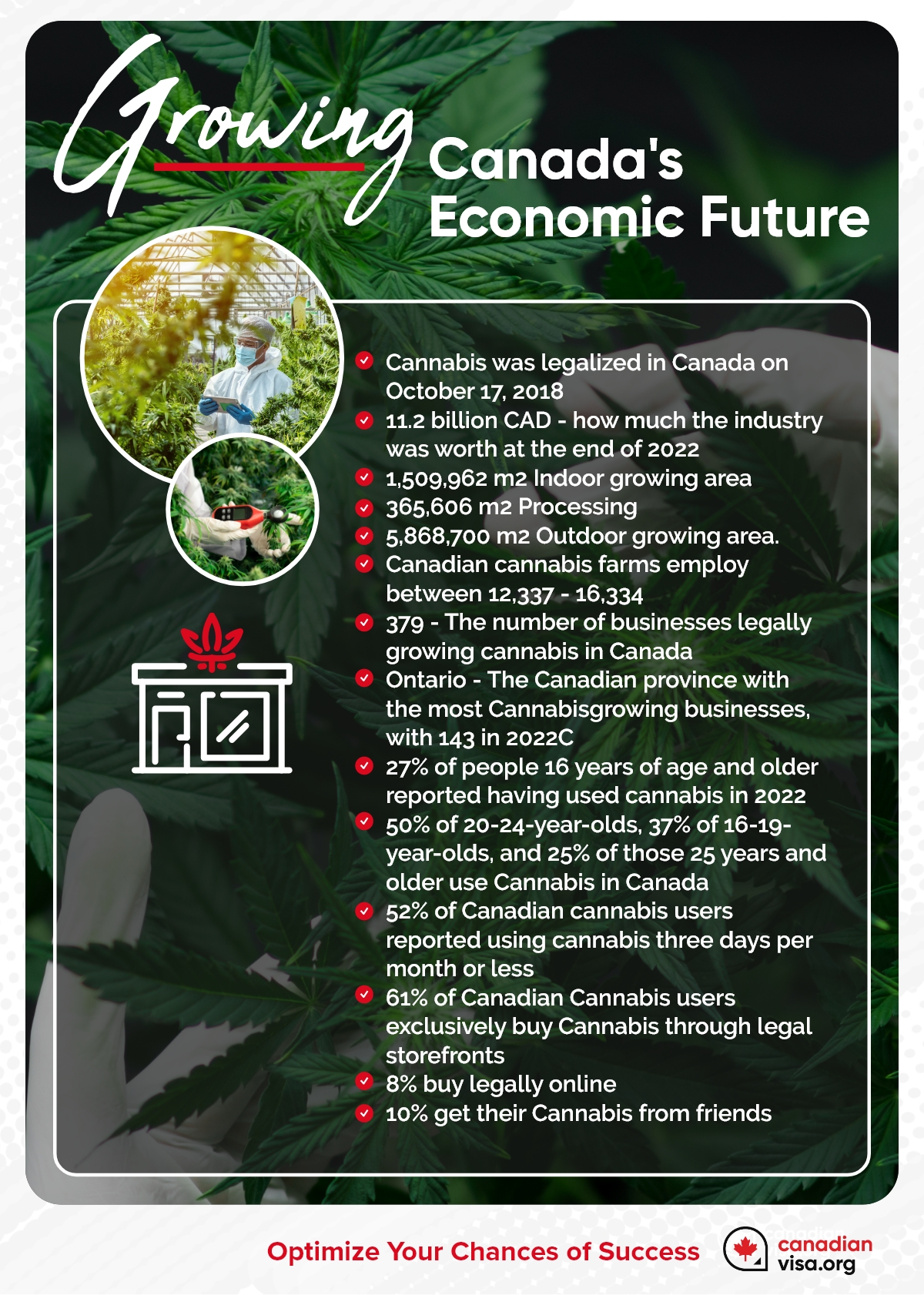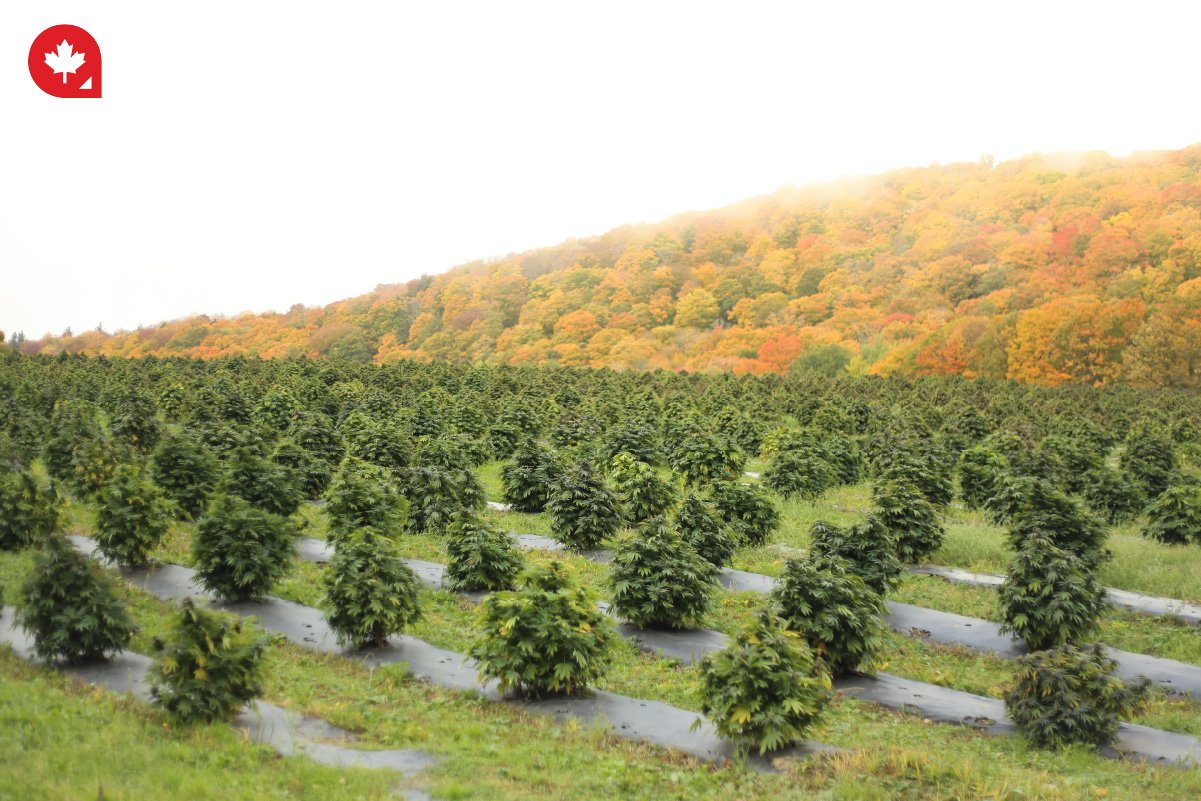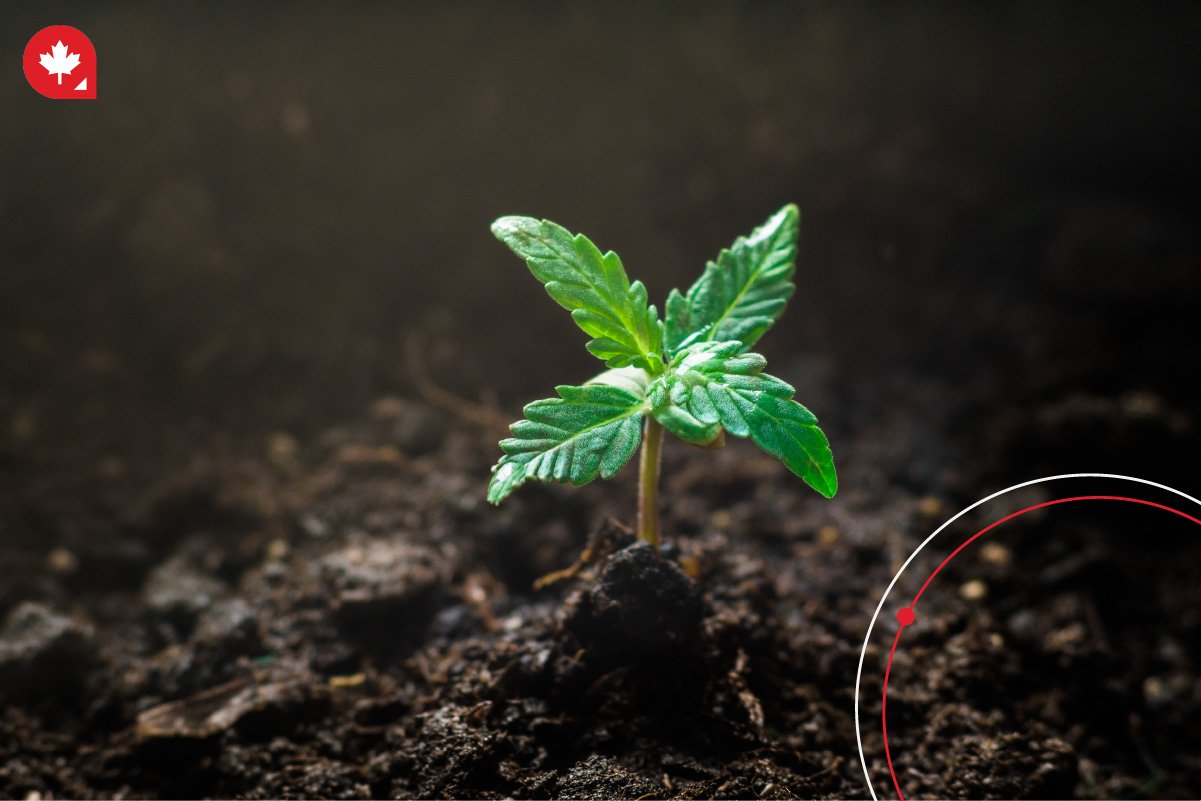As the global cannabis industry grows, Canada becomes an increasingly attractive destination for career-cultivating individuals. If you're considering becoming a cannabis farmer in the Land of the Maple Leaf, you're in the right place. This article will guide you through everything from visa and immigration pathways to starting your cannabis farm and the best provinces for cannabis jobs in Canada. So sit back, relax, and embark on this journey together!
Cannabis in Canada: What’s the Status?

Ever since October 17, 2018, you've probably wondered, "Is cannabis legal in Canada?" It's a fair question, and the answer is yes. The Cannabis Act, also known as Bill C-45, was passed in the Canadian Senate, making it legal for adults to possess, share, buy, or grow cannabis. The law extends to all provinces and territories, making Canada the second country in the world, after Uruguay, to legalize the plant nationwide.
The Cannabis Act outlines certain restrictions, such as the age limit for consumption, retail structures, and possession limits. Generally, you must be at least 19 years old to buy, consume, or cultivate cannabis, but the age limit is 18 in Alberta and Quebec. You can possess up to 30 grams of dried cannabis in public, and there's no limit to how much you can keep at home, as long as it's for personal use.
However, it's not a complete free-for-all. The Act imposes strict penalties for selling or giving cannabis to minors and exceeding the possession, production, or distribution limits. So, while cannabis is legal in Canada, it's regulated to ensure public safety.
The Status of Canada's Cannabis Industry
With the green light from the government, the cannabis industry in Canada is flourishing. According to IBISWorld, the industry's worth was estimated to be around 11.2 billion CAD at the end of 2022 and is expected to be even more by the end of this year.
From seed to sale, the industry offers a range of opportunities. You can find cannabis jobs in Canada in cultivation, research and development, marketing, retail, and more. If you have a green thumb and an entrepreneurial spirit, you might be interested in starting your cannabis farm.
The Growth of Canada's Legal Cannabis Industry Since Legalization
Since the legalization of cannabis in 2018, the industry has seen significant growth. In the first three years, the cannabis industry contributed 43.5 billion to Canada's GDP, according to Deloitte. This growth is thanks, in part, to the increase in cannabis jobs in Canada. The industry has created thousands of jobs, contributing to the economy and offering exciting opportunities for residents and immigrants.
The Canadian government has also benefited from the legalization of cannabis. In the fiscal year 2019-2020, the government collected approximately $135 million in excise taxes from legal cannabis sales.
The industry's growth also means more options for consumers. There are now hundreds of legal cannabis stores nationwide, and online sales are also available.
The Potential for a Cannabis Farm in Canada
With the booming cannabis industry, there's great potential for starting a cannabis farm in Canada. The country's vast land, favorable climate, and supportive government policies make it an ideal place for cultivation.
However, it's not as simple as planting a seed and waiting for it to grow. To start a cannabis farm, you must meet certain requirements, obtain a license from Health Canada, and comply with regulations.
As a licensed cannabis farmer, you'll contribute to an industry positively impacting the economy, creating jobs, and providing Canadians and tourists with a regulated, high-quality product.
The Best Pathways to Becoming a Cannabis Farmer in Canada

Express Entry
One of the fastest ways to immigrate to Canada is through the Express Entry system. The point-based system rewards applicants based on age, education, work experience, and language proficiency. This could be a suitable option if you have experience in farming or a related industry. Learn more about Canada's Express Entry system.
Provincial Nominee Programs
Each Canadian province has its immigration program, a Provincial Nominee Program (PNP). These programs are designed to meet the specific needs of each province. If a province has a high demand for cannabis farmers, you could be nominated for immigration. Learn more about Canada's PNPs.
Start-Up Visa
If you're an entrepreneur looking to start a cannabis farm in Canada, the Start-Up Visa could be your ticket. This program aims to attract innovative entrepreneurs who can create jobs in Canada. You'll need a qualifying business and secure support from a designated organization. Learn more about how to start your business in Canada.
Pilot Programs
Several pilot programs aim to attract skilled workers to rural areas of Canada. As a cannabis farmer, the two best programs for you are the Rural and Northern Immigration Pilot and the Atlantic Immigration Pilot. Both offer a pathway to permanent residency for skilled workers who can contribute to the local economy. Learn more about Canada's pilot programs.
Atlantic Immigration Pilot (AIP)
The Atlantic Immigration Pilot (AIP) is a pathway to permanent residence for experienced, non-seasonal workers in specific industries and with specific occupations, and employers interested in participating in the program must apply to become designated employers, which allows them to hire foreign nationals without obtaining a Labour Market Impact Assessment (LMIA) and assist employees hired through the pilot with settlement in their province of residence, and to receive a job offer, applicants must apply for employment opportunities with Atlantic Canadian employers who AIP has designated. Learn more about the Atlantic Immigration Pilot.
Rural and Northern Immigration Pilot (RNIP)
The Rural and Northern Immigration Pilot (RNIP) is a community-driven program designed to spread the benefits of economic immigration to smaller communities by creating a path to permanent residence for skilled foreign workers who want to work and live in one of the participating communities. Cannabis farmers can apply for permanent resident status through these pilots if they meet community-specific eligibility and federal selection criteria and have a full-time permanent job with a local employer. Learn more about the RNIP.
Work Permits
To work as a cannabis farmer for an existing cannabis farm in Canada, you will need a work permit. Canada has a wide variety of work permits, each designed for different applicants and purposes. The most common of these is the Temporary Foreign Work Permit (TFWP).
Under the TFWP, there are several work permits. However, arguably the best work permit for this job is the Seasonal Agricultural Worker Program (SAWP). This program allows employers to hire temporary foreign workers for up to eight months per year to work in Canada's agricultural sector. To be eligible for the SAWP, you must be a citizen of a participating country, have a job offer from a Canadian employer, and meet certain health and security requirements.
You may be asked to work on more than one farm while you're in Canada, but you don't need a new work permit for each employer. It's important to note that even if you have a work permit, it is illegal to enter Canada with cannabis unless you have a prescription for a medication containing cannabis authorized by Health Canada. Learn more about Canada's work permits.
How to Start a Cannabis Farm in Canada as an Immigrant
Now that we've covered the immigration process let's delve into the exciting part - how to start a cannabis farm in Canada. The cannabis laws in Canada are quite comprehensive, so you'll need to ensure you're fully compliant.
Step 1: Check Eligibility for the Start-up Visa Program
To qualify for the Start-up Visa Program, you must meet all four eligibility requirements and the admissibility requirements to enter Canada. These requirements include having a qualifying business, a letter of support from a designated organization, meeting language requirements, and having enough money to settle and live in Canada before making money from your business.
Step 2: Obtain Necessary Licenses
As per the Cannabis Act, a strict legal framework has been created for controlling the production, distribution, sale, and possession of cannabis across Canada. To produce and sell cannabis in Canada, you must obtain licenses from Health Canada and the Canada Revenue Agency (CRA). Health Canada is responsible for issuing licenses for the cultivation, processing, and sale of cannabis for medical and non-medical purposes.
The CRA is responsible for issuing licenses for producing and packaging cannabis products subject to excise duties and taxes. A cultivation license allows growing cannabis indoors and outdoors by cultivating, propagating, and harvesting. This license also permits post-harvesting activities such as drying, trimming, milling, packaging, and labeling.
Agricultural workers can work temporarily in Canada, but they may be asked to work on more than one farm while they're in Canada, and they don't need a new work permit for each employer. However, it is important to note that cannabis and the U.S.-Canada border have certain restrictions, and U.S. laws will not change following Canada's legalization of cannabis.
Getting a license involves submitting a detailed application that includes your proposed activities, security measures, and quality assurance practices. You'll also need to provide evidence of your ability to meet the Good Production Practices (GPP) standards.
Step 3: Plan and Develop Your Cannabis Production Business
This involves obtaining the required licenses from government agencies, developing a business plan, and getting your regulated and approved products to market.
Step 4: Review Guidance from Health Canada
Health Canada guides the Cannabis Licensing Application Guide, Physical Security Measures Guide, Good Production Practices Guide, Security Clearances under the Cannabis Act and Regulations, and Cannabis Fees Order Guide.
Step 5: Follow Industry-wide Rules and Standards
The Cannabis Act creates a strict legal framework for controlling the production, distribution, sale, and possession of cannabis across Canada. This includes industry-wide rules and standards, such as product packaging and labeling requirements, standardized serving sizes and potency, and good production practices.
Step 6: Check Local Laws in Your Province
Be sure to check local laws in your province, as there may be additional regulations and restrictions on the production and sale of cannabis.
Step 7: Seek Legal Advice
You should seek legal advice to comply with all applicable laws and regulations. Immigrants should also be aware of the potential immigration consequences of involvement in the cannabis industry.
Once you've got your license, it's time to choose a location for your farm. While you might be tempted to pick the most beautiful spot, remember that the climate and soil conditions can greatly affect your crop's quality. Therefore, doing your research and consulting with local experts is crucial.
Best Provinces for Cannabis Jobs in Canada

Ontario
Ontario is the most popular province for new immigrants coming to Canada. The province has a large population and a diverse economy, with many job opportunities in various industries, including cannabis. Ontario has a high demand for skilled workers in the cannabis industry, from cultivation to retail. The province has a well-established cannabis retail market with many authorized retailers.
British Columbia
British Columbia is known for its natural beauty and is a popular tourist destination. The province has a thriving cannabis industry with a high demand for skilled workers. British Columbia has a well-established cannabis retail market with many authorized retailers. The province is also home to many licensed producers, making it a hub for cannabis cultivation.
Alberta
Alberta offers some of the most popular natural attractions in the country, including the Rocky Mountains and Dinosaur Provincial Park. The province has a diverse economy and many job opportunities in various industries, including cannabis. Alberta has a high demand for skilled workers in the cannabis industry, from cultivation to retail. The province has a well-established cannabis retail market with many authorized retailers. Alberta’s largest industry is the oil and gas sector, followed by agriculture, forestry, education, tourism, finance, and manufacturing.
Quebec
Quebec is Canada's second most populous province and has a diverse economy, with many job opportunities in various industries, including cannabis. Quebec has a high demand for skilled workers in the cannabis industry, from cultivation to retail. The province has a well-established cannabis retail market with many authorized retailers. Quebec is unique in that it selects its skilled workers for immigration.
Manitoba
Manitoba, in central Canada, has a diverse economy, with many job opportunities in various industries, including cannabis. Manitoba has a high demand for skilled workers in the cannabis industry, from cultivation to retail. The province has a well-established cannabis retail market with many authorized retailers. Manitoba is also home to many licensed producers, making it a hub for cannabis cultivation.
Getting into the cannabis farming business and immigrating to Canada could be your next big adventure. The country's welcoming stance towards cannabis and its promising industry offer excellent opportunities for those willing to leap. So, why not pack your bags, entrepreneurial spirit, and love for cannabis and make Canada your new home?
FAQs

Is Cannabis Legal in Canada for Tourists?
Yes, cannabis is legal for adults aged 19 and over in most provinces and territories and 18 in Alberta and Quebec. However, it's illegal to take cannabis across the Canadian border, regardless of whether it's coming in or going out.
What are the Cannabis Laws in Canada?
Under the Cannabis Act, adults can possess up to 30 grams of dried cannabis in public. It's also legal to cultivate up to four cannabis plants per residence for personal use. However, selling or giving cannabis to minors and exceeding the possession, production, or distribution limits are serious offenses.




